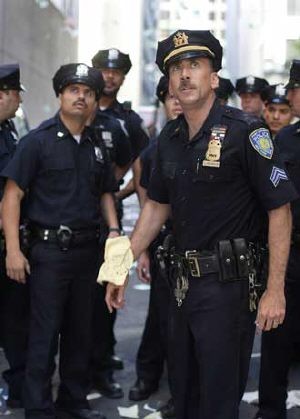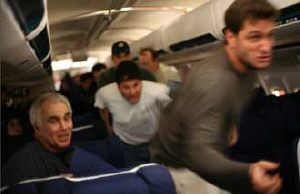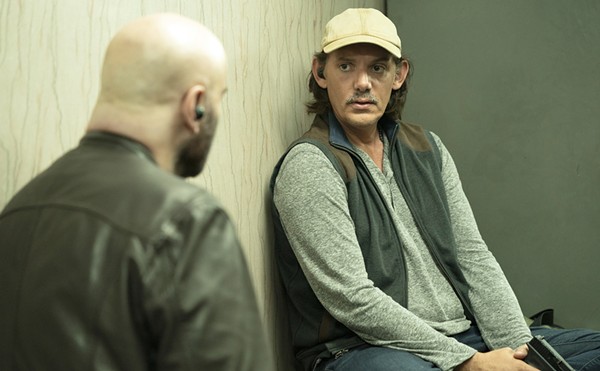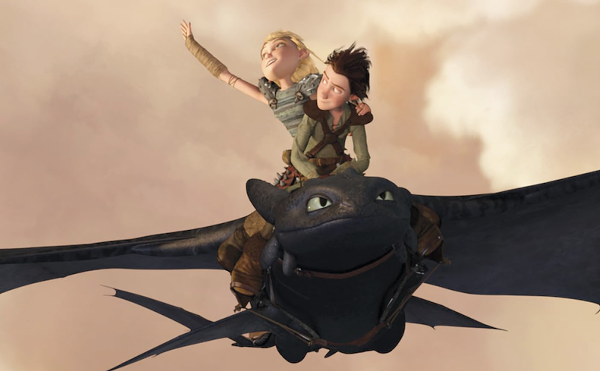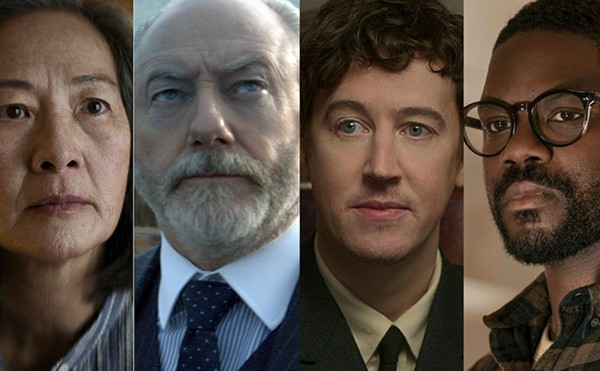| World Trade Center Dir. Oliver Stone; writ. Andrea Berloff; feat. Nicolas Cage, Michael Peña; Maggie Gyllenhaal, Maria Bellow, Michael Shannon (PG—13) |
Each of the two feature films so far set on 9/11 focuses narrowly, ignoring the geopolitical context. United 93 is a meticulous recreation of what must have happened aboard the fourth plane, the one that crashed near Shanksville, Pennsylvania, before it could carry out its hijackers' mission of smashing into the White House. We follow terrorists, flight crew, passengers, and air-traffic controllers minute by minute as the crisis develops, but writer-director Paul Greengrass refuses to dissipate the tension with a wider perspective. And though there might be 8 million stories in the Naked City, World Trade Center offers only two - the ordeal of John McLoughlin (Cage) and Will Jimeno (Peña). Port Authority policemen who rush in to rescue civilians caught in the Trade Center wreckage, they themselves get pinned beneath the rubble of the towers. When, after 12 hours of torment and uncertainty, they are pulled up into daylight, Jimeno looks about and asks what has happened to the buildings. Confined to a Ground Zero view, World Trade Center knows no al Qaeda and, apart from a brief glimpse on a TV screen, no George Bush - nothing but the claustrophobic immediacy of two good men buried alive.
The film's dedication - "For all those who fought, died, and were wounded that day" - suggests inaccurately that 9/ll was a time of combat. The tens of thousands killed and maimed were not exactly fighting. They were victims of mass murder, and though some, especially McLoughlin and Jimeno, exhibited surpassing grace under extraordinary pressure, likening them to soldiers in battle is as accurate and helpful as affixing the label "martyr" to a zealot who blows himself up while sitting on a crowded bus. Just as Jimeno squints through the dark, entombing ruins, desperate for a ray of light, it is natural to seek affirmation even in misfortune. Defeat of the Spanish Armada in 1588 was an utter disaster, except that it kept 30,000 Iberian sailors from eating English food. Stone finds consolation for calamity in the valor of a few good men, but to claim victory over the unseen, unnamed foe because at least McLoughlin and Jimeno lived to tell their tale is an odd way of computing military success. However, Hollywood never did do well with downers.
| United 93 Writ. & dir. Paul Greengrass; feat. Christian Clemenson, Trish Gates, Polly Adams (R) |
Though United 93 and World Trade Center have been criticized for reopening old wounds too soon, both films come too late. Both evoke a lost time of shared trauma, when a fractious nation - competing for compassion over slavery, the Holocaust, the Treaty of Guadalupe Hidalgo, a trail of broken treaties, the potato famine, and other sectarian tribulations - united in the horrors of victimhood. As Brokaw noted, America changed that day, but it responded poorly to defeat. We no longer inhabit that era of good feelings, when anguish joined and ennobled us. And Stone's simple-minded celebration of family, work, love, friendship, and suburbia now seems downright quaint.
The single figure in either film who points beyond the immediacy of 9/11 is retired Marine David Karnes (Shannon). Compelled by his Christian faith and his military ethic, Karnes makes his way alone to rescue those trapped in the ruins. Stalwart and taciturn, like the hero of a Western, he does his deed and then moves on, muttering: "Gonna need some good men out there to avenge this." Titles at the end inform us that Karnes reenlisted in the Marines, serving two tours in Iraq. If Iraq is the promised vengeance, 9/11 will continue forever to blow smoke.

